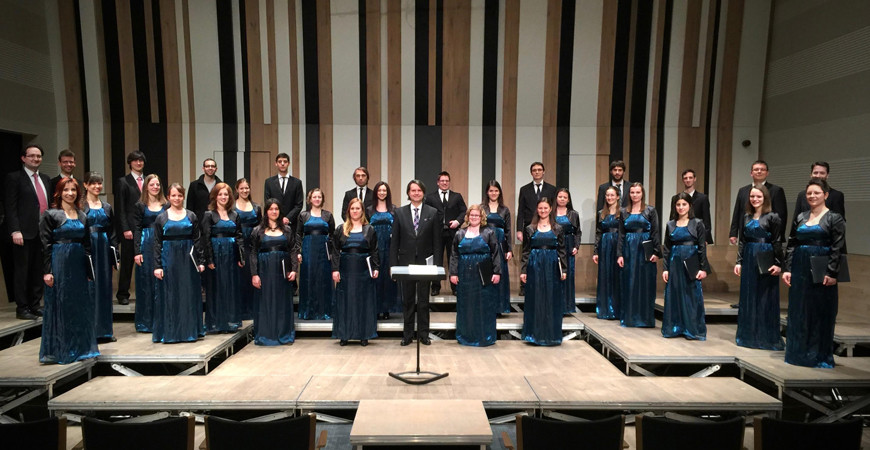
2018. április 14. 19.00-21.00
Solti terem
New Liszt Ferenc Chamber Choir  A Zeneakadémia saját szervezésű programja
A Zeneakadémia saját szervezésű programja
Kodály
Norvég leányok
Orbán György
Ave verum
Orbán György
Daemon Irrepit Callidus
Orbán György
Nunc dimittis
Gyöngyösi Levente
Ha én kedvesemről gondolkodom
Ko Matsushita
Domine, fac me servum pacis tuae
Ko Matsushita
Miserere mei
Ko Matsushita
Tantum ergo
Ko Matsushita
Tenaebrae Factae sunt
Ko Matsushita
O magnum mysterium
Ko Matsushita
De profundis clamavi
Ko Matsushita
Jubilate Deo
Ko Matsushita
Japán Népdalok, 5. kötet – Hyuga Kobiki Uta
Ko Matsushita
Három dal Yaeyama és Miyako szigetéről – Asadoya Yunta
Ko Matsushita
Japán Népdalok, 5. kötet – Mihara Yassa Bushi
-;-Új Liszt Ferenc Kamarakórus (karigazgató: Nemes László Norbert)
Vezényel: Ko Matsushita
Norvég leányok
Orbán György
Ave verum
Orbán György
Daemon Irrepit Callidus
Orbán György
Nunc dimittis
Gyöngyösi Levente
Ha én kedvesemről gondolkodom
Ko Matsushita
Domine, fac me servum pacis tuae
Ko Matsushita
Miserere mei
Ko Matsushita
Tantum ergo
Ko Matsushita
Tenaebrae Factae sunt
Ko Matsushita
O magnum mysterium
Ko Matsushita
De profundis clamavi
Ko Matsushita
Jubilate Deo
Ko Matsushita
Japán Népdalok, 5. kötet – Hyuga Kobiki Uta
Ko Matsushita
Három dal Yaeyama és Miyako szigetéről – Asadoya Yunta
Ko Matsushita
Japán Népdalok, 5. kötet – Mihara Yassa Bushi
-;-Új Liszt Ferenc Kamarakórus (karigazgató: Nemes László Norbert)
Vezényel: Ko Matsushita
Ko Matsushita, one of the most sought-after and productive artists mainly writing a cappella, conducts the choir (created for the classical choral repertoire and contemporary choral canon), which was founded in 2010 by conductor Péter Erdei, and operating under the guidance of László Norbert Nemes from 2014. The Japanese composer was born in 1962 and after studying at a prestigious Tokyo conservatory he went on to the Kodály Institute in Kecskemét. Ko Matsushita manages to blend the European and Japanese traditions to perfection, something evident not only in the diversity of his distinguished oeuvre but also in individual works. His motets and Japanese folk songs performed at this recital draw on music traditions of several thousand years, whether Gregorian or the culture of his native island. The programme offers further interesting points of reference with works by composers representing several generations of Hungarian choral music, starting with a Kodály masterpiece, Norwegian Girls, followed by compositions running the gamut of emotions from the pen of György Orbán, a figure who has bestowed many popular pieces for choirs on audiences and singers over past decades. The 40s age group associated with this style is represented by the setting to music of the Petőfi poem by Orbán student Levente Gyöngyösi during his years at the Liszt Academy and imbued with Hungarian folk and pop styles.
Jegyár:
HUF 1 200


